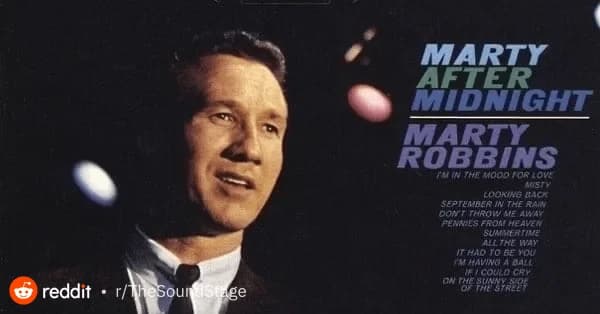
That Golden Glow in a Wet Memory: When the Sweetness of Summer Fades into the Poetic Gloom of Autumn
There are certain songs that, the moment the first gentle, sweeping strings begin, instantly transport you back in time. For anyone who grew up with the sounds of sophisticated, easy-listening country and pop—that rich, warm intersection where the genres danced with grace—Marty Robbins’ rendition of “September in the Rain” is one of those indelible markers. It’s not one of his sweeping, Grammy-winning Western sagas like “El Paso,” but rather a quiet, reflective masterpiece that speaks to the shared human experience of gazing back at a vanished moment of pure happiness.
The song itself is a Tin Pan Alley standard, a relic of a bygone era, written by the legendary team of Harry Warren (music) and Al Dubin (lyrics) and originally published way back in 1937. It had seen a number of successful versions over the decades by artists like Guy Lombardo and Dinah Washington. However, it was the voice of Marty Robbins, the Arizona boy who could just as easily croon a lush ballad as he could sing a tale of a gunfighter, that gave it a particular, almost luminous sheen in the early 1960s.
Robbins released his version of “September in the Rain” on his 1962 album, Marty After Midnight. This particular album showcased his versatile ability to slip effortlessly into the realm of traditional pop and Great American Songbook standards, moving away from his famed cowboy material, yet carrying all the sincerity of a storyteller into the arrangement. While it’s not typically noted for major chart dominance when measured against his mega-hits like “El Paso” (a dual Country and Pop No. 1), it remains a cornerstone of the smooth, classic countrypolitan sound he perfected. For listeners of a certain age, who valued the purity of a vocal performance and the lush orchestration that defined the era, this recording holds a more profound, personal chart position—it went straight to the heart. It’s a track that feels less like a record and more like a cherished memory whispered across the decades.
The meaning of the song is beautifully simple, yet profoundly resonant: it is the perfect musical expression of nostalgia. The lyrics juxtapose a warm, sun-drenched memory—a moment of young love in May—with the present reality of September’s chill and rain. The lover is not physically present; the sun has long gone. But the emotional connection is so powerful that the speaker finds solace, finding the perfect melody, simply by dwelling on the past. The music, with its elegant piano and gentle brush strokes on the drums, feels like a slow, deliberate waltz through a deserted ballroom. Robbins’ delivery is key here. His voice, typically vibrant and commanding, is softened, imbued with a gentle melancholy that suggests a man sitting alone by a window, the rain streaking the glass as he watches the leaves turn. He is not heartbroken, but reflective—the ache is a sweet one.
This particular rendition captures a very specific feeling of the early 1960s, a time when the world was changing rapidly, yet a certain comfort could still be found in the enduring melodies of the past. Marty Robbins acted as a bridge, his deep country roots giving him an authenticity that smoothed out the sometimes-artificial gloss of pop arrangements. When he sings, “The sun may disappear, but September in the Rain will still remember,” he isn’t just reciting a lyric; he’s giving voice to the very act of preserving a precious moment in time against the inevitable march of the calendar. This is why it speaks so powerfully to the older listener: it validates the power of memory, assuring us that some feelings are not lost, merely filed away, waiting for the right sound—or the first drop of autumn rain—to bring them vividly back to life. It’s a moment of musical perfection, an echo from a time when a simple, well-crafted song was all the therapy one needed.